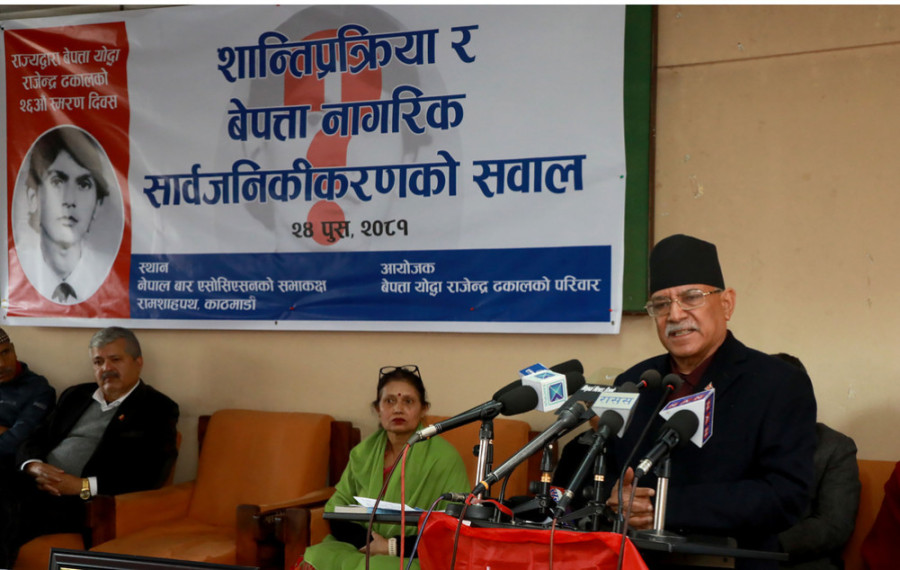Politics
Dahal blames UML, interest groups for stalled peace process
Urges conflict victims to hit the streets to mount pressure.
Binod Ghimire
Amid uncertainty over appointing office bearers to the two transitional justice commissions, CPN (Maoist Centre) chair Pushpa Kamal Dahal has accused certain interest groups of turning transitional justice into a business and a political force of using it as a tool to keep the Maoist Centre in check.
Without naming the CPN-UML, Dahal, a former prime minister and leader of the opposition, said there is a political tendency which wants to prolong the transitional justice process as it is the only tool with which to attack the Maoists. He also said those who have turned the transitional justice process into a business also do not want to see it conclude.
In their central committee meetings, both of which concluded on Tuesday, the two communist parties were sharply critical of each other but silent on the Nepali Congress.
Addressing an event marking the 26th memorial day of Rajendra Dhakal, a victim of enforced disappearance, in the Capital on Wednesday, Dahal also called on victims to jointly hit the streets to build pressure to expedite the peace process. “If you don’t put pressure, it might take another 18 years for the transitional justice process to conclude. I am also planning on putting political pressure,” he said. “I want to create pressure both from the street and Parliament.”
The central committee meeting of the third largest party on Tuesday had held the government responsible for the stalled transitional justice process. “It [Maoist Centre] takes serious exception to the government’s reluctance in concluding the remaining tasks of the peace process and demands the immediate formation of the Truth and Reconciliation Commission and the Commission of Investigation on Enforced Disappeared Persons,” reads one of 16 decisions made by the meeting.
In October, the government, with the consent of the major three parties, had constituted a five-member panel led by former Chief Justice Om Prakash Mishra to nominate chairpersons and members for the two commissions. However, the panel failed to accomplish its task within the given two months due to differences over the name of the TRC chair. The Mishra committee requested the government to constitute another panel to nominate the 10 office bearers.
Over three weeks have passed since the committee’s tenure ended, and there has been no progress on constituting a new committee. The formation of the committee appears unlikely without a broader understanding among the Nepali Congress, the CPN-UML and the Maoist Centre.
There has been no discussion between Prime Minister KP Sharma Oli, Dahal and Congress President Sher Bahadur Deuba on a new panel. “I am planning to talk to Prime Minister Oli and Congress chief Deuba to put pressure on them,” announced Dahal.
But if the claims of UML leaders are to be believed, the government is serious about concluding the transitional justice process and has no intent of prolonging it under any pretext. Putting forth his view in the same event, Agni Kharel, a UML leader, said the party’s central committee meeting that concluded Tuesday has agreed to expedite the process.
“Both the government and our party are committed to concluding the peace process. The party’s political document presented in the central committee emphasises the importance of successfully concluding the peace process and the government’s commitment towards it,” he said. Kharel said that all three top leaders—Deuba, Oli and Dahal—must acknowledge their collective failure in taking the process forward.
The victims from the decade-long Maoist insurgency say no government has ever worked seriously to conclude the transitional justice process. “Successive governments have adopted a policy of trying to tire the victims,” said Suman Adhikari, founding chairperson of the Conflict Victims Common Platform. “We want to know when the new search committee will be formed.”
The National Human Rights Commission has also been consulting stakeholders to collect their suggestions before making recommendations to the government to resume the selection process.
“Delaying the formation of the selection committee is also disrespectful of the Supreme Court ruling. The government should constitute a new committee without delay after consulting all relevant parties,” said Surya Dhungel, a member of the commission.
In March last year, the top court had ordered the government to commence the process of selecting office bearers for the two transitional justice commissions within a week. Issuing the full text of the January 29 verdict in March, the court had given the government a month to start the selection process.
The commissions have been vacant since July 2022, after the government decided to extend their terms without retaining their chairs and members.




 11.12°C Kathmandu
11.12°C Kathmandu















